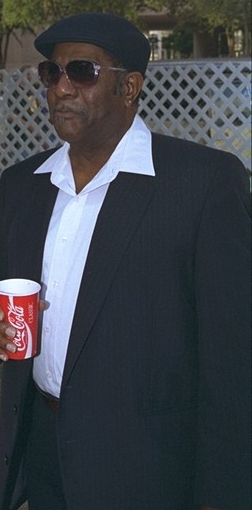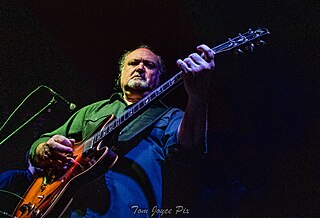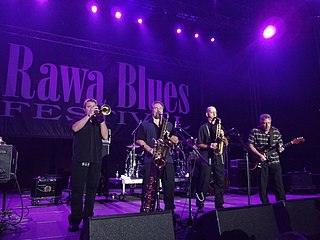Related Research Articles

Mathis James Reed was an American blues musician and songwriter. His particular style of electric blues was popular with blues as well as non-blues audiences. Reed's songs such as "Honest I Do" (1957), "Baby What You Want Me to Do" (1960), "Big Boss Man" (1961), and "Bright Lights, Big City" (1961) appeared on both Billboard magazine's rhythm and blues and Hot 100 singles charts.

Johnnie Clyde Johnson was an American pianist who played jazz, blues, and rock and roll. His work with Chuck Berry led to his induction into the Rock and Roll Hall of Fame. He was posthumously awarded the Congressional Gold Medal for breaking racial barriers in the military as a Montford Point Marine, where he endured racism and inspired social change while integrating the previously all-white Marine Corps during World War II.

The Neville Brothers were an American R&B/soul/funk group, formed in 1976 in New Orleans, Louisiana.

Hard bop is a subgenre of jazz that is an extension of bebop music. Journalists and record companies began using the term in the mid-1950s to describe a new current within jazz that incorporated influences from rhythm and blues, gospel music, and blues, especially in saxophone and piano playing.

John Paul Hammond is an American singer and musician. The son of record producer John H. Hammond, he is sometimes referred to as John Hammond Jr.

James Henry Cotton was an American blues harmonica player, singer and songwriter, who performed and recorded with many fellow blues artists and with his own band. He also played drums early in his career.

Charles Douglas Musselwhite is an American blues harmonica player and bandleader, one who came to prominence, along with Mike Bloomfield, Paul Butterfield, and Elvin Bishop, as a pivotal figure in helping to revive the Chicago Blues movement of the 1960s. He has often been identified as a "white bluesman".

Tinsley Ellis is an American blues and rock musician, who was born in Atlanta, Georgia, United States, and grew up in South Florida. According to Billboard, "nobody has released more consistently excellent blues albums than Atlanta's Tinsley Ellis. He sings like a man possessed and wields a mean lead guitar."

Lonnie Brooks was an American blues singer and guitarist. The musicologist Robert Palmer, writing in Rolling Stone, stated, "His music is witty, soulful and ferociously energetic, brimming with novel harmonic turnarounds, committed vocals and simply astonishing guitar work." Jon Pareles, a music critic for the New York Times, wrote, "He sings in a rowdy baritone, sliding and rasping in songs that celebrate lust, fulfilled and unfulfilled; his guitar solos are pointed and unhurried, with a tone that slices cleanly across the beat. Wearing a cowboy hat, he looks like the embodiment of a good-time bluesman." Howard Reich, a music critic for the Chicago Tribune, wrote, "...the music that thundered from Brooks' instrument and voice...shook the room. His sound was so huge and delivery so ferocious as to make everything alongside him seem a little smaller."
Emery "Detroit Junior" Williams, Jr. was an American Chicago blues pianist, vocalist and songwriter. He is known for songs such as "So Unhappy", "Call My Job", "If I Hadn't Been High", "Ella" and "Money Tree". His songs have been covered by Koko Taylor, Albert King and other blues artists.

Milton Brent Buckner was an American jazz pianist and organist, who in the early 1950s popularized the Hammond organ. He pioneered the parallel chords style that influenced Red Garland, George Shearing, Bill Evans, and Oscar Peterson. Buckner's brother, Ted Buckner, was a jazz saxophonist.
R. Crumb and his Cheap Suit Serenaders are an American retro string band playing songs from, and in the style of, the 1920s: old-time music, ragtime, "evergreen" jazz standards, western swing, country blues, Hawaiian, hokum, vaudeville and medicine show tunes. Underground cartoonist Robert Crumb was the band's frontman and album cover artist. Other members of the band include fellow cartoonist Robert Armstrong and filmmaker Terry Zwigoff.

Chico Freeman is a modern jazz tenor saxophonist and trumpeter and son of jazz saxophonist Von Freeman. He began recording as lead musician in 1976 with Morning Prayer, won the New York Jazz Award in 1979 and earned the Stereo Review Record of the Year in 1981 for his album The Outside Within.

Roomful of Blues is an American jump blues and swing revival big band based in Rhode Island. With a recording career that spans over 50 years, they have toured worldwide and recorded many albums. Roomful of Blues, according to the Chicago Sun-Times, "Swagger, sway and swing with energy and precision". Since 1967, the group’s blend of swing, rock and roll, jump blues, boogie-woogie and soul has earned it five Grammy Award nominations and many other accolades, including seven Blues Music Awards. Billboard called the band "a tour de force of horn-fried blues…Roomful is so tight and so right." The Down Beat International Critics Poll has twice selected Roomful of Blues as Best Blues Band.
"That Lucky Old Sun (Just Rolls around Heaven All Day)" is a 1949 popular song with music by Beasley Smith and words by Haven Gillespie.

Aaron Corthen, better known as A.C. Reed was an American blues saxophonist, closely associated with the Chicago blues scene from the 1940s into the 2000s.

William Clarke was an American blues harmonica player and singer. He was chiefly associated with the Chicago blues style of amplified harmonica, but also incorporated elements of jump blues, swing, and soul jazz into his playing. Clarke was a master of both cross and chromatic harmonica styles and many consider him among the blues harmonica greats.
Johnny "Big Moose" Walker was an American Chicago blues and electric blues pianist and organist. He worked with many blues musicians, including Ike Turner, Sonny Boy Williamson II, Lowell Fulson, Choker Campbell, Elmore James, Earl Hooker, Muddy Waters, Otis Spann, Sunnyland Slim, Jimmy Dawkins and Son Seals.
I'm in the Wrong Business! is an album by the American musician A.C. Reed, released in 1987. Backed by the Spark Plugs, Reed promoted the album with a North American tour. It sold around 50,000 copies in its first two years of release.
In the Shadow of the City is an album by the American musician Maurice John Vaughn, released in 1993. Vaughn supported the album with a North American tour. "(Everything I Do) Got to Be Funky", which was a minor, regional radio hit, appears on the soundtrack to Major League II.
References
- 1 2 3 4 5 6 Bill Dahl (November 6, 1952). "Maurice John Vaughn | Biography". AllMusic . Retrieved September 7, 2015.
- 1 2 Colin Larkin, ed. (1992). The Guinness Encyclopedia of Popular Music (First ed.). Guinness Publishing. p. 2581. ISBN 0-85112-939-0.
- 1 2 Russell, Tony (1997). The Blues – From Robert Johnson to Robert Cray. Dubai: Carlton Books Limited. p. 179. ISBN 1-85868-255-X.
- ↑ "Original Soundtrack - Major League 2 Album Reviews, Songs & More". AllMusic . Retrieved October 11, 2023.
- ↑ "Maurice John Vaughn - In the Shadow of the City Album Reviews, Songs & More". AllMusic . Retrieved October 11, 2023.
- ↑ "Maurice John Vaughn Albums and Discography". AllMusic . Retrieved October 11, 2023.